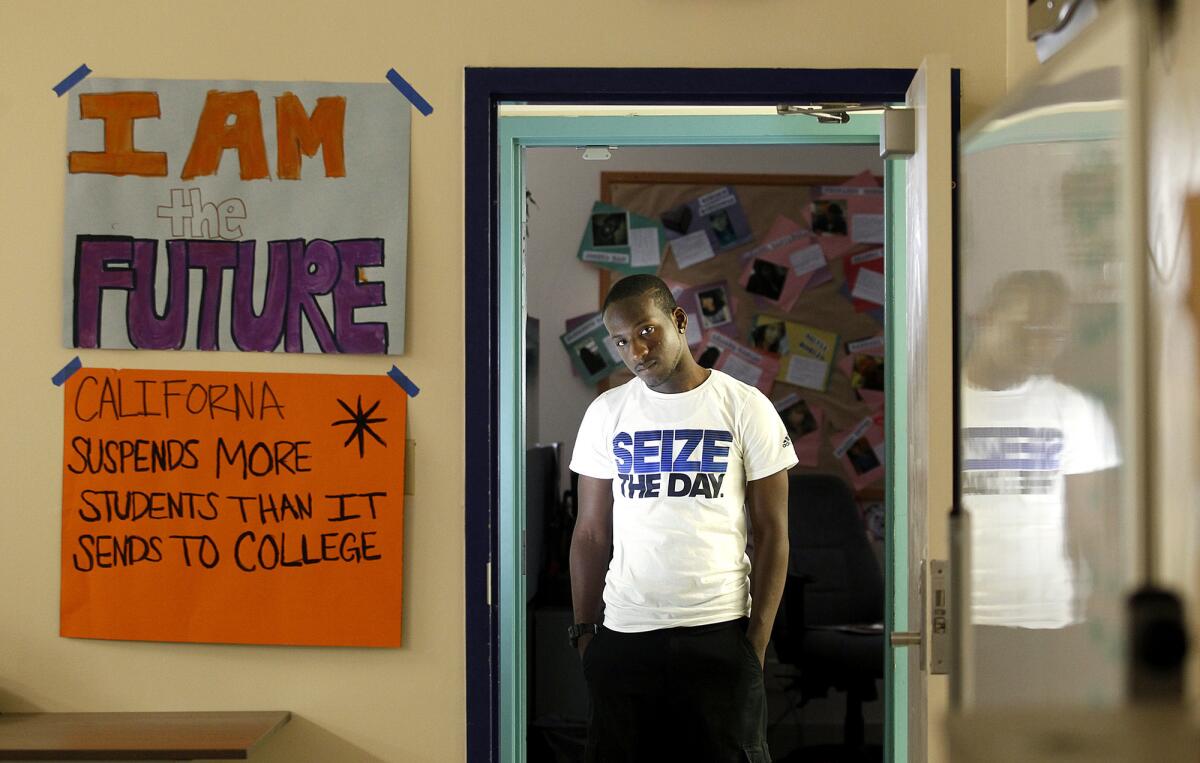Federal guidelines unveiled to avoid racial bias in school discipline

- Share via
Federal officials kicked up their campaign against discriminatory school discipline policies Wednesday, issuing first-ever guidelines for school districts on how to avoid racial disparities in student punishments.
In a 23-page letter, officials with the U.S. departments of justice and education said they recognized schools must use discipline to promote a “safe and orderly” environment but that federal data and investigations showed that African Americans were punished more harshly and frequently than whites in similar situations. Black students without disabilities were three times more likely than white peers to be expelled or suspended, according to data collected by the education department’s Office for Civil Rights.
Officials said they would actively enforce federal laws against bias in school discipline practices, reporting that they had received 1,600 complaints since 2009 and had launched several reviews of school districts. The first action was taken against Los Angeles Unified, which resulted in a 2011 voluntary agreement that requires the nation’s second-largest school district to track and report discipline data and eliminate “inequitable and disproportionate” practices.
Along with the letter, officials released recommendations for school districts on how to promote safe schools without violating student rights. They include building a campus climate with high expectations and rewards for good behavior, tracking data on disciplinary actions, creating student codes of conduct that spell out sanctions for violations, offering staff training on conflict resolution, providing adequate counselors and social workers, and defining appropriate roles for police on campus.
“A routine school discipline infraction should land a student in a principal’s office -- not in a police precinct,” U.S. Atty. Gen. Eric Holder said in an appearance in Baltimore with U.S. Education Secretary Arne Duncan.
In Los Angeles, civil rights advocates hailed the federal guidelines as a “groundbreaking action” in pushing an issue they have worked on for years onto the national agenda.
“These guidelines send a strong message that ending discrimination in school discipline isn’t just a local issue; it’s an issue for our entire state and our nation,” said Laura Faer, statewide education rights director for Public Counsel, a Los Angeles-based pro bono law firm. “Harsh discipline rules put students on the fast track to failing grades, dropping out of school and coming into contact with juvenile and criminal justice systems. This groundbreaking action … will help shift the focus of school discipline to prevention and support,” she said.
Manuel Criollo of the Los Angeles-based Community Rights Campaign, which has lobbied to limit the role of police on campuses, said the federal action was an “important marker” of the success of community activism on the issue. The campaign and others helped push the Los Angeles Board of Education to pass the nation’s first ban on suspensions for student defiance last year.
Advocates are currently working to circumscribe police involvement on campus and are pressing for more funding for school- and community-based programs shown to be more effective in improving student behavior. L.A. Unified beefed up spending on campus security aides last year by $4 million following the 2012 school shooting in Connecticut, but is currently budgeting less than $1 million for an alternative program known as restorative justice, Criollo said.
Randi Weingarten, president of the American Federation of Teachers, said also that more money was needed to pay for the counselors, staff training and other federal recommendations. “Policies in a vacuum without actual resources and support will not succeed,” she said in a statement.
The Obama administration is proposing a new $50-million grant program to improve student behavior and make campuses safer, according to Deborah S. Delisle, assistant secretary for elementary and secondary education.
ALSO:
L.A. finally hiring teachers again
Report calls L.A. a city in decline, warns of leadership crisis
Ex-teacher convicted of student sex charges released from jail early
Twitter: @TeresaWatanabe
More to Read
Sign up for Essential California
The most important California stories and recommendations in your inbox every morning.
You may occasionally receive promotional content from the Los Angeles Times.














